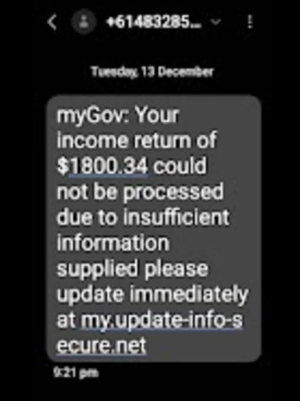Don't fall for this dangerous scam text targeting myGov users!
- Replies 19
‘Tis the season to be jolly… and alert!
There are reports of a new text message scam circulating the cyber corridors.
MyGov users especially need to be on the lookout, as the scam is impersonating the Australian government.
This one is particularly sneaky; its aim is to get hold of your personal details through something called ‘phishing’, where scammers trick people out of important personal details like usernames and passwords.
Someone posted a screenshot of the text on Facebook, warning others about it.
The message, which is sent from an unrecognised mobile number, reads: ‘Your income return of $1800.34 could not be processed due to insufficient information supplied. Please update immediately at (link).’
‘This is another SCAM doing the rounds, please don’t fall for it,’ he wrote.

MyGov has been the subject of various scams throughout the year, including one reported by our member @Cecily E. about an ‘outstanding refund’ later confirmed by Services Australia to be a scam.
It's true — it can be hard to tell a real message from a fake. But there are a couple of key warning signs to look out for if you get a text like this.
Firstly: it came from a mobile number. Several reputable sources, including the Australian Competition and Consumer Commission, say that myGov will never send you anything from a mobile number.
Last November, Services Australia also issued a similar reminder.
‘Watch out! Scammers want your personal information and may pretend to be from myGov, Services Australia or one of your linked government services,’ they said.
‘MyGov will never send you personal emails or SMS with links, web addresses or attachments. Don’t click on links, don’t open attachments, or respond to the sender.’
The second key indicator is language and grammar. Any tax or government-related messages you receive should always be professional and well-written. Grammatical errors, odd punctuation, and strange, informal language can often be a sign of someone up to no good.

Another thing that complicates the whole situation is that scammers can also pretend to be your bank and other services through a technique called spoofing where they use technology that makes messages, calls, and emails appear on your phone as if they come from legitimate channels (e.g the scam message appears on the same thread as those from your bank’s regular ones).
The holidays have seen a rise in warnings about various means fraudsters will try to swindle people out of their money at a time when the mood is generally festive and people let their guards down.
By the year’s end, the Australian Consumer & Competition (ACCC) estimates that Aussies will lose up to $4 billion to scams.
If ever you come across a suspicious-looking message or any other form of contact asking you to give out information — especially account details — we stress: do not engage, and simply ignore. You may also opt to block the number on your phone.
Now, if you think you’ve replied to a scam, myGov says to contact their Scams and Identity Theft Helpdesk on 1800 941 126.
You may also report the scam to the ACCC’s Scamwatch programme and access their guidelines on what you can do in case you fall victim.

As much as we want to tell only feel-good stories for the silly season, we also want to do our part to warn members to keep an eye out for these nasty scammers.
Check out our Scam Watch forum to be updated!
What is your reaction to this news? Have you come across a similar scam using myGov? What did you do?
Share your thoughts and experiences below!
Source: YouTube/7News Australia
There are reports of a new text message scam circulating the cyber corridors.
MyGov users especially need to be on the lookout, as the scam is impersonating the Australian government.
This one is particularly sneaky; its aim is to get hold of your personal details through something called ‘phishing’, where scammers trick people out of important personal details like usernames and passwords.
Someone posted a screenshot of the text on Facebook, warning others about it.
The message, which is sent from an unrecognised mobile number, reads: ‘Your income return of $1800.34 could not be processed due to insufficient information supplied. Please update immediately at (link).’
‘This is another SCAM doing the rounds, please don’t fall for it,’ he wrote.

A Facebook user has warned of a new text scam targeting myGov users. Stock Image Credit: Pexels/SHVETS production
MyGov has been the subject of various scams throughout the year, including one reported by our member @Cecily E. about an ‘outstanding refund’ later confirmed by Services Australia to be a scam.
It's true — it can be hard to tell a real message from a fake. But there are a couple of key warning signs to look out for if you get a text like this.
Firstly: it came from a mobile number. Several reputable sources, including the Australian Competition and Consumer Commission, say that myGov will never send you anything from a mobile number.
Last November, Services Australia also issued a similar reminder.
‘Watch out! Scammers want your personal information and may pretend to be from myGov, Services Australia or one of your linked government services,’ they said.
‘MyGov will never send you personal emails or SMS with links, web addresses or attachments. Don’t click on links, don’t open attachments, or respond to the sender.’
The second key indicator is language and grammar. Any tax or government-related messages you receive should always be professional and well-written. Grammatical errors, odd punctuation, and strange, informal language can often be a sign of someone up to no good.

Never click on links in messages or correspondences that ask you to update your information as these lead to fake websites. Stock Image Credit: Pexels/cottonbro studio
Another thing that complicates the whole situation is that scammers can also pretend to be your bank and other services through a technique called spoofing where they use technology that makes messages, calls, and emails appear on your phone as if they come from legitimate channels (e.g the scam message appears on the same thread as those from your bank’s regular ones).
The holidays have seen a rise in warnings about various means fraudsters will try to swindle people out of their money at a time when the mood is generally festive and people let their guards down.
By the year’s end, the Australian Consumer & Competition (ACCC) estimates that Aussies will lose up to $4 billion to scams.
If ever you come across a suspicious-looking message or any other form of contact asking you to give out information — especially account details — we stress: do not engage, and simply ignore. You may also opt to block the number on your phone.
Now, if you think you’ve replied to a scam, myGov says to contact their Scams and Identity Theft Helpdesk on 1800 941 126.
You may also report the scam to the ACCC’s Scamwatch programme and access their guidelines on what you can do in case you fall victim.
Key Takeaways
- Users of the Australian government's myGov website are warned about a new text message scam in circulation which is requesting personal details for people to receive an 'income return'.
- The text message, sent from an unrecognised mobile number, requests the recipient to update their information and provides a link to do so, which is a potential sign of phishing attack.
- The Australian Competition and Consumer Commission and the myGov website both have active warnings about phishing scams and have released example images of what potential scams messages may look like.
- If you receive any suspicious messages, you should call the Scams and Identity Theft Helpdesk on 1800 941 126.
Check out our Scam Watch forum to be updated!
What is your reaction to this news? Have you come across a similar scam using myGov? What did you do?
Share your thoughts and experiences below!
Source: YouTube/7News Australia







